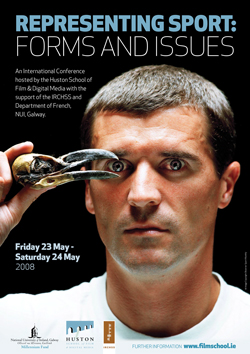Sport, Identity & Representation
Sport, Identity & Representation

Leader: Dr. Seán Crosson
Members:
Dr. Seán Crosson (Film Studies)
Dr. Philip Dine (French)
Dr. Tony Hall (Education)
Prof. Gearóid Ó Laighin (Electronic Engineering)
Dr. John Kenny (English and Journalism)
Dr. John Morrissey (Geography)
Dr. Kevin O'Sullivan (History)
Dr. John Breslin (DERI)
Dr. Cathal Kilcline (French & Université de Lyon)
Dr. Conn Holohan (Film Studies)
Dr. Patrick Lonergan (English and Drama Studies)
Dr. Marcus Free (Media Studies, MIC, UL)
Tony Tracy (Film Studies)
Valerie Butler (Digital Media)
Ruadhán Cooke (French)
Éamon Ó Cofaigh (French)
James Curry (DAH)
Invited collaborators: Dr. John Cunningham (History), Dr. Micheál Newell (Medical Informatics & Education). Apart from the individuals listed above, there are also possibilities of collaborations with further colleagues in DERI, University of Limerick and in the College of Engineering & Informatics which currently offers a BE/MEngSc in Sports & Exercise Engineering while the College of Medicine, Nursing, & Health Sciences offers two sport-related postgraduate degrees including MScs in Sports & Exercise Physiotherapy and Sports & Exercise Medicine.
Description:
This proposed research area emerges from ongoing research projects in the Huston School of Film & Digital Media and the Discipline of French though sport is also the subject of research in disciplines across the College of Arts, Social Sciences, & Celtic Studies as well as elsewhere in the University. This research area builds on the belief that sport and its representation has contributed significantly to the construction, and questioning, of local, regional, national and international identities. Sport annually mobilizes millions of people across the world: as practitioners in a wide variety of competitive, educational, recreational and, increasingly, health-related contexts; and as spectators, whether physically present or, more typically, following events via the mass media. In so doing, sporting practices and representations contribute significantly to the social construction of identities, through the elaboration of discourses and networks of power relations that, together, both shape and serve to legitimize highly distinctive processes of socialization. These mechanisms may be regarded negatively, for instance, by Marxist, Foucauldian and feminist critics respectively, as alienating, disciplinary and/or patriarchal. They may also be interpreted more positively, as permitting self-expression and even self-actualization of various kinds, in a tradition of linking the playing of games to the education of the young that stretches at least as far back as the Roman concept of mens sana in corpore sano (a healthy mind in a healthy body). However, perhaps most persuasively, sport may be understood as combining both positive and negative features, depending on the specific situations in which it is practised, watched, listened to, read about or otherwise consumed, and thus on the variety of individual and collective experiences to which it may give rise.
Given its prominence in Ireland in particular it is surprising that to date, unlike the UK, US, and most other European countries, dedicated research clusters/centres devoted to sport have as yet not been established on this island within the humanities and social sciences. This offers NUI, Galway - which has already established a considerable reputation nationally and internationally for its athletes, teams and sports facilities - a great opportunity to establish a distinctive research cluster that will attract students, academics and potentially funding in the future given sport's prominence and relevance across a broad range of disciplines - including in IT, with the recent expansion of EA Games in Galway city, and engineering and medicine, where the university already has dedicated sports degree programmes. There is also huge potential for collaboration with UL - already a strategic partner for the university and a leading centre for sport in Ireland. Among the areas that we propose examining as part of this research cluster:
- The role of the media in the representation and popularisation of sport
- The role of sport in identity formation
- Sport and Politics in Ireland and internationally
- The historical role and development of Sport.
- Sport and gender
- Sport and decolonisation
- Sport in literature
- The role of sport in constructions of place and space.
- Sport and Education
- Sport and film
- Sport and globalisation
- Sport and Journalism
- Sport and digital media/gaming
- Sport and Language
Sport is an area that is a concern of a broad array of disciplines from history to sociology, politics, film studies, media studies, journalism, Irish studies, languages and the sciences. Indeed, sport is relevant to each of the disciplines within the College of Arts, Social Sciences, & Celtic Studies and provides a unique point of contact for academics engaged in a broad range of areas which also includes social and cultural geography, education, information technology and psychology. Sports history and the representation of sport in popular culture have become increasingly important research areas over the past twenty years. This is evident for instance in the growth of research into what Lawrence Wenner has described as MediaSport, research which responds to the increasing hyper-mediatisation of sport such that much of the recent development of sport internationally has been media-led within a hugely commercialised market place.
Status: On-going

